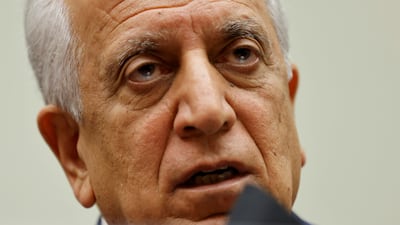Zalmay Khalilzad, the US envoy who negotiated the 2020 withdrawal deal with the Taliban that is widely viewed as pivotal in the hardliners' subsequent takeover of Afghanistan, has stepped down from his role, US Secretary of State Antony Blinken said on Monday.
"I extend my gratitude for his decades of service to the American people," Mr Blinken said in a brief message.
Mr Khalilzad will “transition” from his role and be replaced by his deputy, Thomas West, less than two months after the final US troops departed Afghanistan and left behind thousands of Afghans who had helped America over the decades.
Regarding his departure, Mr Khalilzad expressed his sentiments in a thread of tweets on Twitter: "It has been an honour to serve the American people again."
While not surprising, experts see the Biden administration's decision to get rid of Mr Khalilzad as being too little, too late.
“Mr Khalilzad negotiated a bad deal with the Taliban, which triggered a debacle that he failed to anticipate or handle," said Husain Haqqani, the director for South and Central Asia at the Hudson Institute.
Mr Haqqani, a former Pakistani ambassador to the US, saw a much-weakened US hand in Kabul because of Mr Khalilzad's February 2020 deal.
“He equated US withdrawal with peace … then handed the keys to Kabul to the Taliban in return for promises he knew the Taliban would not keep,” Mr Haqqani told The National.
He hoped Mr West has a better understanding of “who the Taliban are and what might be the limits of negotiating with them.”
A State Department source told The National that differences grew between Mr Khalilzad and Mr West following the Taliban takeover of Afghanistan.
A frustrated Mr West openly complained that Mr Khalilzad was not allowing him to sit on meetings with the Taliban that the now-former envoy was holding in Doha.
The 2020 deal that Mr Khalilzad negotiated under Donald Trump excluded then-president Ashraf Ghani's government while also granting sweeping concessions to the Taliban, including a requirement for Mr Ghani to release 5,000 Taliban prisoners in return for only 1,000 pro-Ghani captives.
In the months after securing the deal, the Taliban stressed the importance of a diplomatic end to the conflict, even as their foot-soldiers were unleashing brutal assaults on demoralised Afghan forces.
And the Taliban never agreed to break ties with Al Qaeda, instead only promising to stop the group "from using the soil of Afghanistan to threaten the security of the United States and its allies".
Mr West will become the special representative for Afghanistan and "will lead diplomatic efforts" and "co-ordinate closely with the US embassy Kabul presence in Doha on America's interests in Afghanistan", Mr Blinken said in his statement.
Mr West is seen as an insider in the Biden circle. He worked with Mr Biden when he was vice president as special advisor for South and Central Asia, and before that as national security council director for Afghanistan until 2015. He joined the State Department in January.
In mid-August, the US-backed Afghan government collapsed as the Taliban swept through the country and seized Kabul virtually unopposed.
Mr Khalilzad and the US were left asking for the militant group's help in the chaotic US withdrawal from Kabul.
Current and former US officials told Reuters earlier that in the three years Mr Khalilzad had been in his role as envoy, he became the face of one of the largest US diplomatic failures in recent memory.
Afghanistan-born Mr Khalilzad was educated at the American University in Beirut and the University of Chicago. Following the September 11 attacks on the US in 2001, then-president George W Bush picked him to help plan the invasion and Afghanistan's transition to civilian government.
He served as US ambassador to post-Taliban Afghanistan from 2003 to 2005.
Mr Khalilzad was the American point person coordinating with the Iraqi opposition in the lead up to the 2003 invasion of Iraq. Later, as ambassador to Iraq in 2005, Mr Khalilzad worked to bring together different political groups to approve a new constitution, and was instrumental in running the first elections after the fall of former dictator Saddam Hussein.


